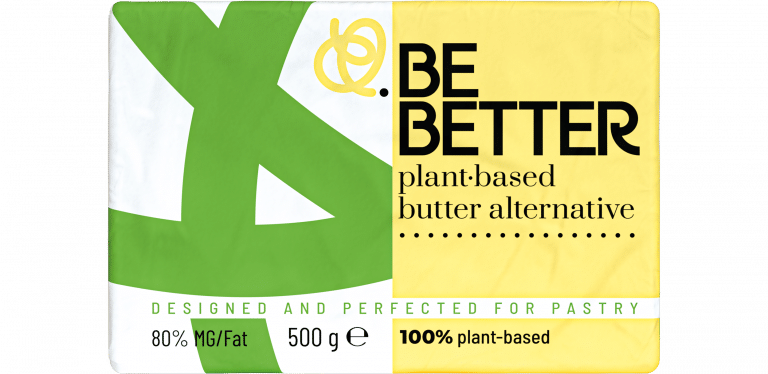Be Better plant-butter alternative
Sustainability score results by Eaternity
Comparison to cow-butter
Be Better plant-based butter produces 248.6 gCO2e/100g, whereas cow-butter 1211 gCO2e/100g. This means that Be Better plant-based butter emits 79% less CO2 than butter from the cow! As for the water footprint, Be Better blocks use 4.2 L scarce water/100g and Be Better sheets use 0,9 L scarce water/100g whereas butter produced in the Netherlands 30.6 L. This means that Be Better plant-based butter has a 86-97% better water footprint than cow-butter!
CO2-footprint
With regard to the ingredients, the carbon footprint is dominated by the shea oil with 74.9%, followed by the coconut fat (15.5%) and the sunflower oil (9.1%). Transport accounts for 9% of the impact of the CO2 emissions. Here included are: the transport of the ingredients to the production facility, the transport of the product to the distribution centre, transport of the packaging to the production facility and the distribution transport of the product to the customers to all countries.
The processing of Be Better plant-butter itself only contributes a very low amount to the overall impact as only low amounts of energy inputs are needed.
Be Better Butter – Wrapper 500g
Agriculture 82.1%
Processing 1.6%
Packaging 2.2%
Transport 13.3%
Storage 0.8%
Be Better Butter – Wrapper 2 kg
Agriculture 87.1%
Processing 1.9%
Packaging 1.0%
Transport 9.0%
Storage 1.0%
Be Better Butter – Wrapper 2.5kg
Agriculture 82.0%
Processing 1.6%
Packaging 2.4%
Transport 13.2%
Storage 0.8%
Be Better Butter – Wrapper 10kg
Agriculture 83.4%
Processing 1.6%
Packaging 1.0%
Transport 13.3%
Storage 0.8%




Water footprint
For the water footprint, the fresh water used for irrigation of the crops is assessed in regard to the water scarcity in each country.
Shea nut is a forestry product and is not specifically farmed, fertilized or irrigated. Therefore, the water scarcity footprint in the agricultural stage is 0.
The water footprint is dominated in equal shares by the coconut fat and the sunflower oil, both approximately 50%.
Be Better plant-butter PRODUCES 61% LESS CO2 EMISSIONS THAN THE AVERAGE RECIPE AND IS WITHIN THE LIMITS OF A CLIMATE-FRIENDLY DIET.
Animal Welfare
The product is vegan, and therefore receives 3 stars.
Rainforest
There are no ingredients which immediately endanger the rainforest. Thus, the product receives 3 stars.
Key assumptions
Ingredients
For ingredients sourced from multiple countries, the amount of it in the recipe was divided equally.
Distribution to the countries
Distribution to the countries: For the transport to the countries (NL, UK, FR, ES, D, B), it was assumed a cooled lorry with reefer (big-sized lorry), total of 549 km, and ferry 16km. To consider the transported weights, the weight of the product itself (500g, 2.5kg and 10kg) and the weights of the packaging are considered.
Distribution within the countries
Distribution within the countries: A total of 261 km by lorry with refrigeration machine were estimated.
Packaging
Packaging: production of the raw materials, their transport, processing into final product and disposal of the packaging in Europe are included. The transport of the packaging to the production facility is included in the transport share.
Processing
Processing: The electricity-mix was assumed as ecopower, since it’s “CO2 neutral”. Moreover, the amount of water was considered 20% in the product with addition of the wastewater produced in the processing. The amount of waste produced and disposed was estimated.



